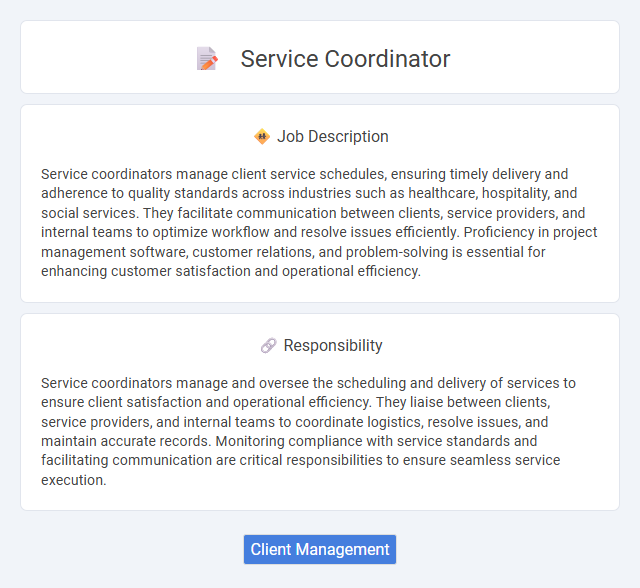
Service coordinators manage client service schedules, ensuring timely delivery and adherence to quality standards across industries such as healthcare, hospitality, and social services. They facilitate communication between clients, service providers, and internal teams to optimize workflow and resolve issues efficiently. Proficiency in project management software, customer relations, and problem-solving is essential for enhancing customer satisfaction and operational efficiency.
People who are highly organized, empathetic, and able to manage multiple tasks simultaneously are likely suitable for a Service Coordinator role. Those with strong communication skills and the ability to remain calm under pressure may adapt well to the dynamic demands of coordinating services. Individuals who struggle with multitasking or lack interpersonal skills might find this job challenging.
Qualification
Service coordinator positions typically require a high school diploma or equivalent, though a bachelor's degree in business administration, healthcare, or social services enhances employability. Strong organizational skills, effective communication, and proficiency with scheduling software are essential qualifications. Experience in customer service or project management is often preferred to efficiently oversee client needs and service delivery.
Responsibility
Service coordinators manage and oversee the scheduling and delivery of services to ensure client satisfaction and operational efficiency. They liaise between clients, service providers, and internal teams to coordinate logistics, resolve issues, and maintain accurate records. Monitoring compliance with service standards and facilitating communication are critical responsibilities to ensure seamless service execution.
Benefit
Service coordinator roles likely offer benefits such as improved team communication and streamlined service delivery, enhancing overall efficiency. Employees in this position probably experience opportunities for skill development in project management and client relations. The position may also provide a supportive work environment with potential for career advancement in service-oriented industries.
Challenge
Service coordinator roles likely involve managing multiple client needs simultaneously, which can present significant organizational challenges. The position probably requires balancing urgent requests with routine tasks, demanding strong prioritization skills. Navigating complex communication between clients, service providers, and internal teams may also pose ongoing difficulties.
Career Advancement
Service coordinators play a crucial role in managing client needs and facilitating communication between service providers, which builds a strong foundation for leadership positions. Gaining expertise in project management, client relations, and operational workflows enhances opportunities for promotion to senior coordinator or service manager roles. Mastery of industry-specific software and certification in related fields significantly boosts career advancement prospects.
Key Terms
Client Management
Service coordinators play a critical role in client management by assessing client needs, developing tailored service plans, and maintaining ongoing communication to ensure satisfaction. They coordinate resources and schedules to deliver timely support, monitor progress, and address any challenges promptly. Efficient client management by service coordinators enhances service quality, fosters trust, and improves client retention rates.
 kuljobs.com
kuljobs.com